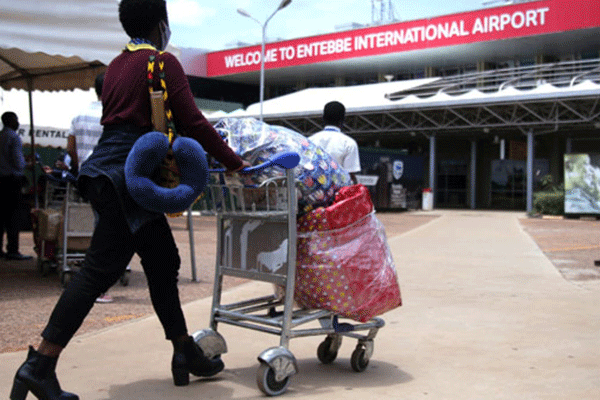Prime
Entebbe airport security audit kicks off

A female passenger pushes a luggage trolley towards Entebbe Airport Terminal recently. Photo/ File
What you need to know:
- Mr Vianney Luggya, the manager of public affairs at UCCA, confirmed the development but declined to divulge details.
A comprehensive International Civil Aviation Organisation (ICAO) Universal Safety Oversight Audit (USOAP CMA) has kicked off at Entebbe International Airport, authorities yesterday confirmed.
The audit is aimed at assessing level of conformity on legal provisions; if they are in harmony with the international legal provision and can ensure safety and security.
It is also aimed at establishing the Uganda Civil Aviation Authority (UCAA) preparedness in terms of having qualified officers, inspectors, and its mandates and; the current relationship between civil-military cooperation and coordination that ensure an enhanced and optimised management and use of the space.
Mr Vianney Luggya, the manager of public affairs at UCCA, yesterday confirmed the development but declined to divulge details.
“It (audit) started but it may not be a good idea to delve deep into it. It’s better to wait for it to end. Discussing details of it in the media when it’s ongoing may jeopardise it for the country. I request that we first hang on,” he said.
Ms Sheila Ajok Lubangakene, the UCAA principal public affairs officer, also declined to give details.
“We were asked not to divulge [information] about it until it ends in a few days,” she said.
It is barely two weeks since the UCAA and security bodies unveiled a nine-member committee of the pioneer Civil Military Aviation Policy Board (CMAB), who have been assessing the state’s compliance with international/national civil aviation regulations and provide valuable insights for further improvement.
The CMAB was unveiled in preparation of this audit whose results are critical in the future growth of Uganda’s aviation industry.
The board, after its inception, was tasked to ensure that there is a streamlined Air Traffic Management, compliance with ICAO guidelines and enhancement of national aviation security.
The positive results will not only create confidence in Uganda’s air space by the international community but also unlock more flights for Uganda Airlines, according to officials.
ICAO, a global UN agency, has a core mandate of coordinating the principles and techniques of international air navigation and fosters the planning and development of international air transport to ensure safety and growth, through ensuring global interoperability and harmonisation of the Air Traffic Management (ATM) operational concept.
This is done through carrying out periodic audits in different countries operating the aviation industry.
During the 2017 Universal Security Audit Programme – Continuous Monitoring Approach (USAP-CMA), which was conducted by ICAO, Uganda performed moderately well, after scoring 81.8 percent which was above the global average of 73 percent and the African and Indian Ocean (AFI) states average of 58 percent.
After the audit, the government went back on the drawing board and formulated relevant policies and laws such as the Civil Aviation Act 2017 CAP354 to close the remaining gaps.
During the August 17 inauguration ceremony of the CMAB members, the minister of works and transport, Gen Edward Katumba Wamala, said the ICAO strategic objectives could be achieved through harmonisation of activities between the civil and military aviation authorities.
It is barely two years since ICAO issued the 2021 manual on Civil-Military Cooperation in Air Traffic Management (Doc 10088), which provides information and guidance for aviation authorities to establish a CMAB to oversee the implementation of civil-military cooperation and coordination procedures.




